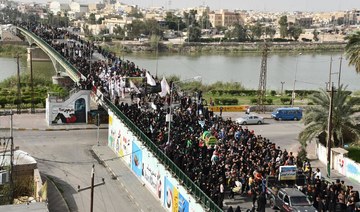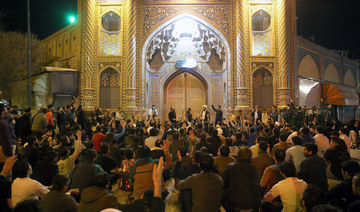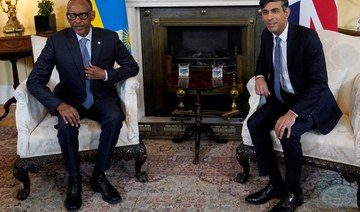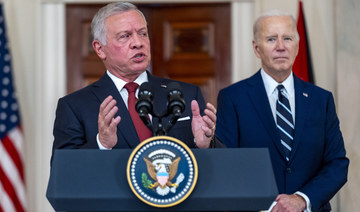BEIRUT: Shiite Muslims are observing the solemn holy day of Ashoura that they typically mark with large, mournful gatherings, in the shadow of the coronavirus pandemic.
Ashoura commemorates the seventh-century killing of Imam Hussein, the grandson of the Prophet Muhammad, in the Battle of Karbala in present-day Iraq with the army of then Caliph Yazid, to whom Hussein had refused to pledge allegiance.
“At its heart, It’s the story of the sacrifice of an extraordinary religious figure,” said Noor Zaidi, who teaches history at the University of Maryland, Baltimore County and researches Shiite Islam. “It’s (also) the story of familial love between Hussein and those who were with him in Karbala. ...It also has this real, sort of revolutionary component to it,” she said.
“What has made it endure so powerfully ... is the fact that it has at its core the ability to meld itself to what, I think, people need to get from it.”
The Day of Ashoura falls on the 10th of the Islamic month of Muharram and is preceded by days of commemorations and remembrance. The public expressions of communal mourning are generally associated with Shiites. For many Sunnis, Ashoura is a remembrance of more than one event, including the Moses-led exodus from Egypt.
In Iraq, pilgrims ordinarily converge on the holy city of Karbala, site of the battle and home to a shrine to Imam Hussein.
But with the pandemic, Iraq’s top Shiite cleric, Grand Ayatollah Ali Al-Sistani, encouraged people to observe the mourning in other ways such as watching online or televised commemorations from home.
Those attending public commemorations must adhere to health guidelines, including social distancing and wearing masks, with caps on the numbers of participants in accordance with the local regulations of different countries, a statement from his office said.
Saif Badr, spokesman for the Iraqi Ministry of Health and Environment, praised Al-Sistani’s statement and call for adhering to health regulations.
“Our opinion is clear,” said Badr. “Generally speaking, we are against congregations in all their forms, including on religious occasions” due to the pandemic. Some Iraqis are not heeding the call to avoid congregating.
In Pakistan, thousands of minority Shiite Muslims rallied in various parts of the country ahead of tomorrow’s Day of Ashoura amid a decline in coronavirus deaths and infections. In his speech to a gathering of Shiite Muslims in the city of Multan, Foreign Minister Shah Mahmood Qureshi asked people to adhere to social distancing rules when they observe Ashoura. Security forces deployed around Shiite places of worship to help secure public rallies which had been targeted by militant groups in the past.
In interviews with The Associated Press, several Shiite Muslims told of how they are observing commemorations this year.
Najaf, Iraq
On a typical day in the mourning period leading up to the Day of Ashoura, Sayyid Sahib Al-Yasseri buys rice, meat and other foodstuffs in the mornings for dinners served to those attending nighttime commemorative gatherings.
Clad in black clothes, he and others listen to recitations of the Qur’an, religious lectures and lamentations. Some bury their faces in their palms as they weep. Mourners rhythmically beat their chests in grief.
“There are tears and heartbreak for Imam Hussein,” Al-Yasseri said.
This year the rituals were held outside, he said, and men distributed disposable masks and pumped sanitizer into outstretched hands.
Al-Yasseri wore a mask out of coronavirus considerations but didn’t consider skipping the commemorations.
“If God wants me to get infected, I will,” he said.
Al-Yasseri estimated that about 750 people have been taking part each night in the gathering, fewer than in previous years due to the pandemic.
On Ashoura Day — which in Iraq falls on Sunday — at least one tradition of his will remain unchanged: donating blood.
“I donate to benefit others,” Al-Yasseri said, “and out of love for Imam Hussein.”
Nabatiyeh, Lebanon
Ashoura comes as Lebanon reels from not only the pandemic but economic hardship and the aftermath of a massive explosion that ripped through its capital this month.
Amid a partial coronavirus lockdown, the two largest Shiite groups in Lebanon, the militant group Hezbollah and the Amal movement of Parliament Speaker Nabih Berri, have urged people to mark Ashoura at home with the help of television and social media.
Yasser Qameh, who for decades in the past attended public gatherings every night during the mourning period, has been watching from home this year.
“I watch it on TV or YouTube — as long as I don’t mingle with people,” Qameh said by phone from his southern Lebanese city, which in normal years is a site of massive Ashoura observations. “The difference is like watching a football match on TV rather than being at the stadium.”
This year, Qameh said, despite a curfew, some people are gathering every night in a city square with masks, temperature checks and plastic chairs spaced out.
Typically, Nabatiyeh’s annual Ashoura ceremonies are attended by tens of thousands of people with some men cutting and beating their heads to symbolize and recall the pain of Imam Hussein, their dripping blood soiling white clothes. Such scenes are criticized by some Shiite clerics who denounce the ritual.
Qameh is also forsaking another tradition this year. Normally he would help distribute water, juice and a special dish called Harisa — that consists of wheat and chicken or beef — to participants who come from other areas.
Hicksville, New York
In the United States, some Shiite communities are broadcasting commemorations online.
In Hicksville, on New York’s Long Island, Fatima Mukhi-Siwji had been feeling sad that her 10-month-old daughter will miss out on the rituals.
“I have grown up in the mosque,” she said, her voice cracking with emotion. “How are we supposed to teach our children religion? How are we supposed to teach them (about) Imam Hussein?”
But shortly before the start of Muharram, a number of Shiite Muslims from different communities, including Mukhi-Siwji’s father, teamed up to organize drive-in commemorations to safely mark the occasion, she said.
Held at a movie theater’s outdoor parking lots, they feature scholarly sermons, poetry recitals, chanting and lamentations as families listen from their cars and watch on large screens. Some get out of their cars and watch or engage in chest beating mourning rituals while social distancing, she said.
The daily events have attracted hundreds of cars and, Mukhi-Siwji said, revived a feeling of togetherness she sorely missed.
“It’s such an electrifying experience,” she said. “It goes through your whole body.”
Shiite Muslims mark holy day of mourning in virus’ shadow
https://arab.news/4s5s7
Shiite Muslims mark holy day of mourning in virus’ shadow
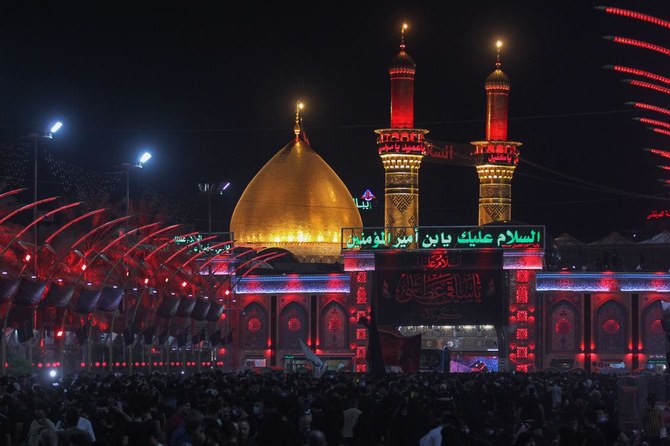
- Ashoura commemorates the seventh-century killing of Imam Hussein, the grandson of the Prophet Muhammad, in the Battle of Karbala in present-day Iraq
- The Day of Ashoura falls on the 10th of the Islamic month of Muharram and is preceded by days of commemorations and remembrance
Philippines rules out use of water cannon in disputed South China Sea

- Philippines and China have clashed several times in disputed, resource-rich waterway
- Latest skirmish took place late last month, in an incident Manila describes as dangerous
MANILA: President Ferdinand Marcos Jr. said on Monday that Manila will not use offensive equipment in the disputed South China Sea, after China’s coast guard used high-pressure water cannon on Philippine vessels last week.
The Philippines and China have had several confrontations in the resource-rich area, where Beijing has used water cannon against Filipino vessels in incidents Manila has described as harassment and dangerous.
The latest in a string of maritime clashes occurred on April 30 as tensions continued to rise in the vital waterway that Beijing claims almost in its entirety despite a 2016 international arbitration ruling that rejected its assertion.
“What we are doing is defending our sovereign rights and our sovereignty in the West Philippine Sea. And we have no intention of attacking anyone with water cannons or any other such offensive (weapons),” Marcos said Monday.
“We will not follow the Chinese coast guard and the Chinese vessels down that road because it is not the mission of the navy (or) our coast guard to start or to increase tensions … Their mission is precisely the opposite, it’s to lower tensions.”
Philippine vessels have been regularly targeted by Chinese ships in areas of the South China Sea that are internationally recognized as belonging to the Philippines, which Manila calls the West Philippine Sea.
The Philippines’ Ministry of Foreign Affairs last Thursday summoned Zhou Zhiyong, China’s deputy chief of mission, after the incident left a Philippine coast guard vessel and another government boat damaged.
It was the 20th protest Manila has made against Beijing’s conduct in the South China Sea this year alone, while more than 150 diplomatic complaints have been made over the past two years.
Marcos said the Philippines will continue to respond to South China Sea incidents through diplomatic means.
Marcos’s statement comes days after the defense ministers of the Philippines, the US, Japan and Australia met in Hawaii and issued a joint statement on their strong objections to the “dangerous and destabilizing conduct” of China in the South China Sea.
UK considered Rwanda-style asylum deal with Iraq
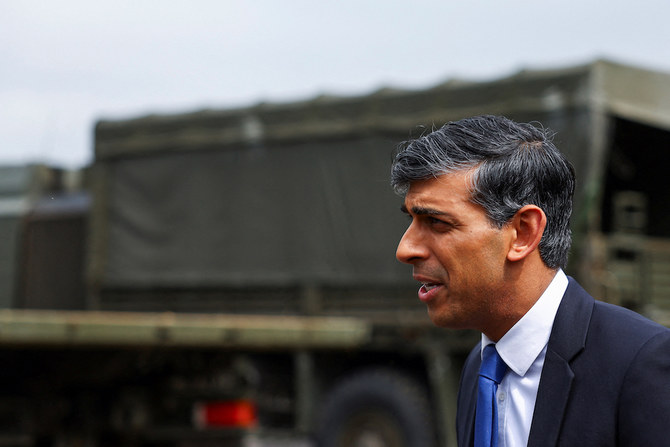
- Documents seen by Sky News reveal London has struck returns agreement with Baghdad
- They also suggest a desire to improve relations with Iran to return people to the country
LONDON: The UK considered sending asylum-seekers to Iraq for processing, new documents have shown.
Iraq is considered very dangerous, with the UK government advising against all travel to the country.
But a plan similar to the Rwanda scheme to process migrants in a third-party country was floated at one stage by Whitehall officials, with negotiations said to have achieved “good recent progress.”
The UK has struck a returns agreement with Baghdad for Iraqi citizens, which was achieved without a formal announcement or acknowledgement and a plea for “discretion,” the documents, seen by Sky News, suggest.
The cache of papers casts new light on the UK government’s approach to dealing with asylum-seekers and illegal migration, including a desire to improve relations with the Iranian Embassy in London in order to ease the repatriation of Iranian citizens, and moves to establish return agreements with Eritrea and Ethiopia.
Biden meets Jordan’s King Abdullah as Gaza ceasefire hopes dim
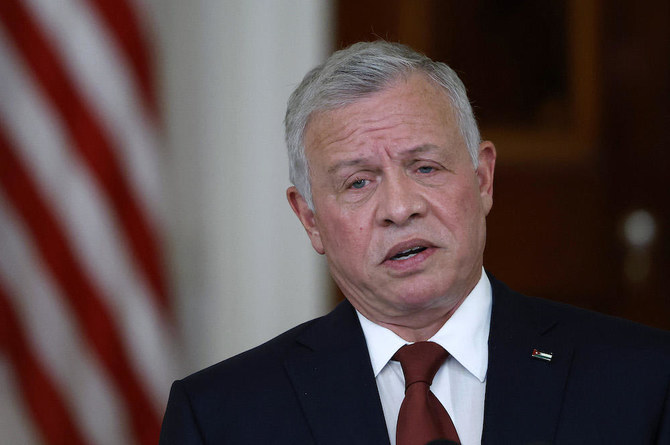
- Monday’s meeting between two leaders is not a formal bilateral meeting but an informal private meeting
- US president Biden faces increasing pressure politically to convince Israel to hold off on an invasion
WASHINGTON: President Joe Biden will meet Middle East ally, Jordan’s King Abdullah II, at the White House on Monday with prospects for a Gaza ceasefire appearing slim and Palestinian Islamist group Hamas and Israeli officials blaming each other for the impasse.
On Sunday, Hamas reiterated its demand for an end to the war in exchange for the freeing of hostages, and Israeli Prime Minister Benjamin Netanyahu flatly ruled that out. Hamas also attacked the Kerem Shalom crossing into Gaza that Israel said killed three of its soldiers.
A Jordanian diplomat said Monday’s meeting between Biden and King Abdullah is not a formal bilateral meeting but an informal private meeting. It comes as the Biden administration and Israeli officials remain at odds over Israel’s planned military incursion in Rafah.
Biden last met King Abdullah at the White House in February and the two longtime allies discussed a daunting list of challenges, including a looming Israeli ground offensive in southern Gaza and the threat of a humanitarian calamity among Palestinian civilians. Jordan and other Arab states have been highly critical of Israel’s actions and have been demanding a ceasefire since mid-October as civilian casualties began to skyrocket. The war began after Hamas stunned Israel with a cross-border raid on Oct. 7 in which 1,200 people were killed and 252 hostages taken, according to Israeli tallies.
Biden last spoke to Netanyahu on April 28 and “reiterated his clear position” on a possible invasion of the Gaza border city of Rafah, the White House said. The US president has been vocal in his demand that Israel not undertake a ground offensive in Rafah without a plan to protect Palestinian civilians.
With pro-Palestinian protests erupting across US college campuses, Biden faces increasing pressure politically to convince Israel to hold off on an invasion. Biden addressed the campus unrest over the war in Gaza last week but said the campus protests had not forced him to reconsider his policies in the Middle East.
Russia’s president Putin orders nuclear drills with troops near Ukraine
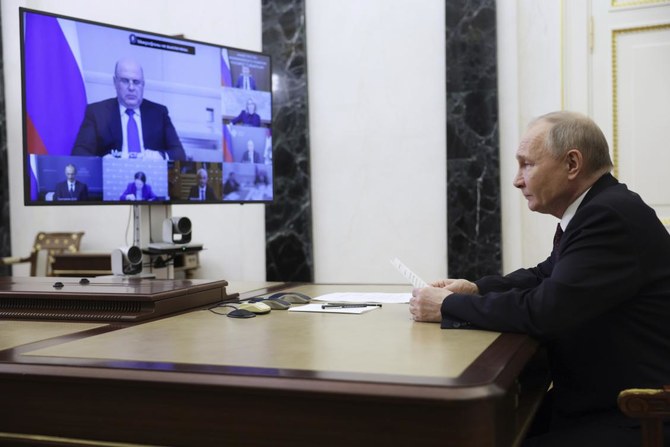
- Putin has upped his nuclear rhetoric since the Ukraine conflict began, warning in his address to the nation in February there was a ‘real’ risk of nuclear war
MOSCOW: President Vladimir Putin has ordered the Russian military to hold nuclear weapons drills involving the navy and troops based near Ukraine, the defense ministry said Monday.
Putin has upped his nuclear rhetoric since the Ukraine conflict began, warning in his address to the nation in February there was a “real” risk of nuclear war.
“During the exercise, a set of measures will be taken to practice the preparation and use of non-strategic nuclear weapons,” the defense ministry said.
Non-strategic nuclear weapons, also known as tactical nuclear weapons, are designed for use on the battlefield and can be delivered via missiles.
The ministry said the exercises would take place “in the near future” and were aimed at ensuring Russia’s territorial integrity in the face of “threats by certain Western officials.”
Aircraft and naval forces will take part, as well as troops from the Southern Military District, which borders Ukraine and includes the occupied Ukrainian territories, it said.
Western officials have become increasingly alarmed by the Kremlin’s nuclear rhetoric during the offensive in Ukraine, with Putin frequently invoking Russia’s nuclear doctrine.
Last year Russia ditched its ratification of the Comprehensive Nuclear Test Ban Treaty and pulled out of a key arms reduction agreement with the United States.
No place to pray for Muslim workers in Italian city

- Urban planning regulations tightly limit the establishment of places of worship, mayor says
- Islam is not among the 13 religions that have official status under Italian law
MONFALCONE, Italy: It’s Friday prayers in the northeastern Italian city of Monfalcone, and hundreds of men are on their knees in a concrete parking lot, their heads bowed to the ground.
They are just a fraction of the city’s Muslims who since November have been banned from praying inside their two cultural centers by Monfalcone’s far-right mayor.
Instead, they assemble in this privately owned construction site as they await a court decision later this month to settle a zoning issue they say has barred their constitutional right to prayer.
Among them is Rejaul Haq, the property’s owner, who expresses frustration over what he and many other Muslims see as harassment by the city they call home.
“Tell me where I should go? Why do I have to go outside of Monfalcone? I live here, I pay taxes here!” lamented Haq, a naturalized Italian citizen who arrived from Bangladesh in 2006.
“Catholics, Orthodox, Protestants, Jehovah’s, if they all have their church — why can’t we have one?”
Immigrants make up a third of this city of 30,000 inhabitants outside Trieste, most of them Bangladeshi Muslims who began arriving in the late 1990s to build cruise-liners for ship builder Fincantieri, whose Monfalcone shipyard is Italy’s largest.
Their presence is immediately visible, whether the Bangladeshi men on bicycles peddling to and from work or the ethnic grocery stores on street corners.
For Mayor Anna Cisint, the restriction on prayer is about zoning, not discrimination.
Urban planning regulations tightly limit the establishment of places of worship, and as a mayor in a secular state, she says it is not her job to provide them.
“As a mayor, I’m not against anybody, I wouldn’t even waste my time being against anybody, you see, but I’m also here to enforce the law,” Cisint said.
Still, she argues the number of Muslim immigrants, boosted by family reunifications and new births, has become “too many for Monfalcone.”
“There are too many... you have to tell it like it is,” she said.
Her warnings about the “social unsustainability” of Monfalcone’s Muslim population have propelled Cisint to national headlines in recent months.
They have also assured her a spot in upcoming European Parliament elections for Matteo Salvini’s anti-immigrant League party, part of Prime Minister Giorgia Meloni’s coalition government.
The League for decades has obstructed mosque openings in its stronghold of northern Italy. But the problem is nationwide in Catholic-majority Italy.
Islam is not among the 13 religions that have official status under Italian law, which complicates efforts to build places of worship.
There are currently fewer than 10 officially recognized mosques, said Yahya Zanolo of the Italian Islamic Religious Community (COREIS), one of the country’s main Muslim associations.
That means that out of Italy’s estimated more than two million Muslims, most are relegated to thousands of makeshift places of worship that “feed prejudice and fear in the non-Muslim population,” said Zanolo.
Cisint, who has been under police protection since receiving online death threats in December, complains about a resistance to integration by what she called a “very closed” community.
She asks why Arabic and not Italian is taught in the community centers and calls “intolerable” wives walking behind husbands or schoolgirls in veils.
In the run-up to European elections, the League has once again seized on illegal immigration to Italy — where nearly 160,000 migrants arrived by boat last year, mostly from Muslim countries — as a vote-winner.
Salvini has called the June vote “a referendum on the future of Europe,” to decide “whether Europe will still exist or whether it will be a Sino-Islamic colony.”
But Monfalcone’s Muslims don’t fit the stereotypes exploited by the League, armed as they are with work permits or passports.
“It’s not like we came here to see the beautiful city of Monfalcone,” jokes Haq. “It’s because there’s work here.”
Many Muslims said they feel a palpable sense of distrust, if not outright hatred, from some of the long-time residents.
Ahmed Raju, 38, who works at Fincantieri installing panels, has mostly prayed at home since the cultural centers have been off-limits.
Such is the reach of the mayor’s rhetoric that “even I get scared” about Muslims, Raju said.
Of the prejudice the community faces, Raju added: “You feel like you’re in front of a big wall, that you can’t break down.”
“We’re foreigners. We can’t change the situation.”
Outside a classroom where volunteers teach Italian to recently immigrated women, Sharmin Islam, 32, said the animosity is acutely felt by her young son who was born in Italy.
“He comes back from school and asks, ‘Mum, are we Muslims bad?’”
An administrative court in Trieste will rule on May 23 whether to uphold or strike down the mayor’s ban on prayer within the cultural centers.
Haq says Monfalcone’s Muslims have “no Plan B” if they lose, but worries even if they win the scars from the stand-off will remain.
Meanwhile Cisint has been actively promoting her book, “Enough Already: Immigration, Islamization, Submission,” warning Monfalcone’s situation could be duplicated elsewhere.
On a recent public holiday, Bangladeshis filled the city’s main square, from little girls with unicorn balloons to groups of young men enjoying a day off.
Looking on was barman Gennaro Pomatico, 24.
“The locals won’t ever accept them,” said Pomatico.
“But ultimately they don’t bother anyone.”



